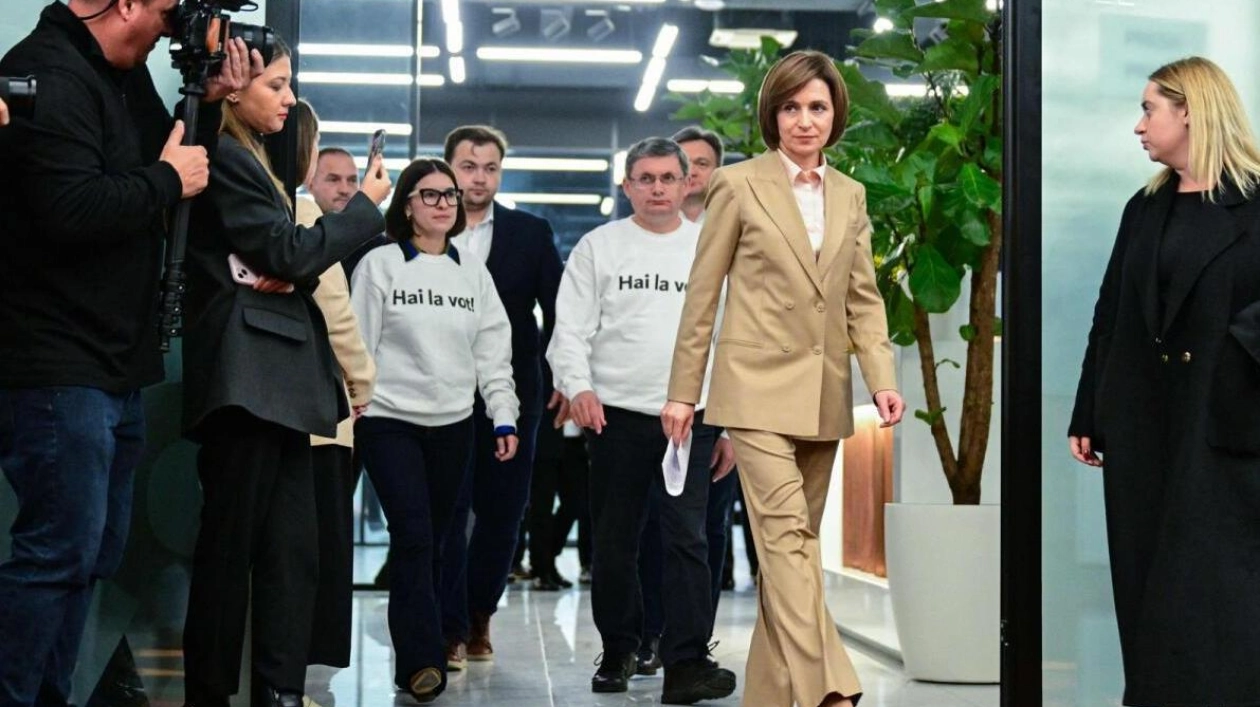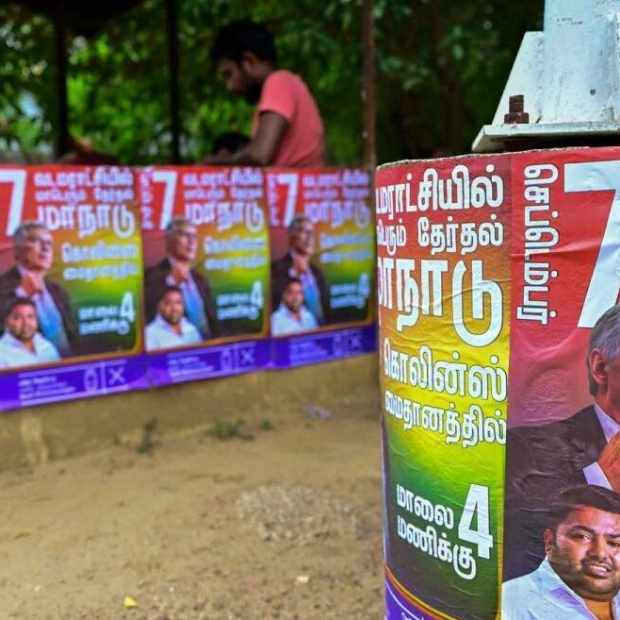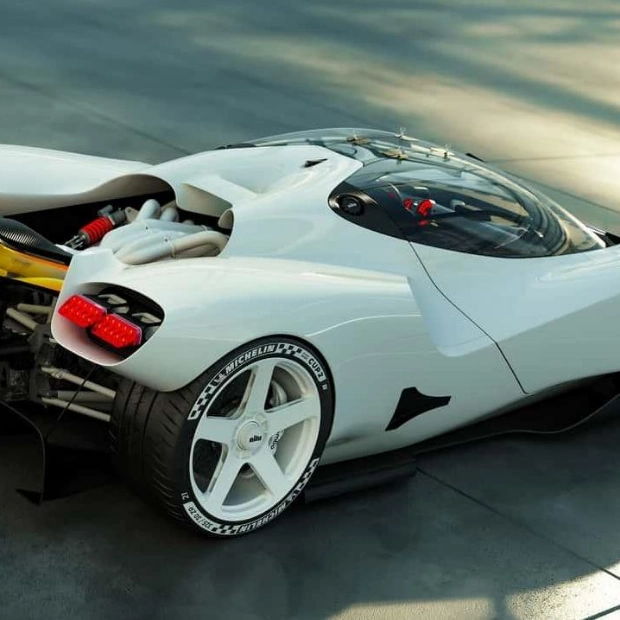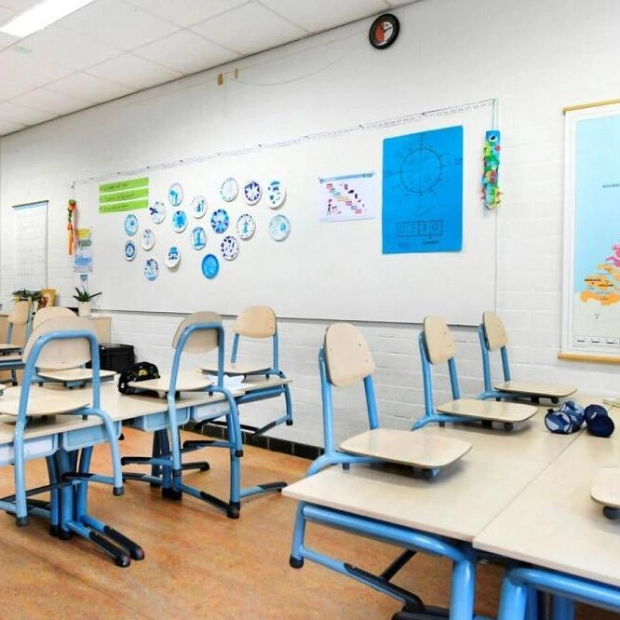Moldova's President Maia Sandu arrived at a press conference at her campaign headquarters in Chisinau on October 21, 2024. — AFP
A referendum on Moldova joining the EU passed with a narrow majority on Monday, with pro-Brussels President Maia Sandu attributing the close outcome to foreign interference, indirectly pointing to Russia, which denied the allegations. The Kremlin urged Sandu to "prove" election interference in the former Soviet republic, which borders war-torn Ukraine, and questioned the vote count in Moldova. Sandu secured the top spot in the first round of presidential elections held concurrently with the referendum on Sunday, but faces a challenging second round against Alexandr Stoianoglo, a former prosecutor supported by the pro-Russian Socialists. Sandu applied for her country, home to 2.6 million people, to join the European Union following Russia's invasion of Ukraine in 2022. With over 99% of the votes counted, the "yes" vote led with 50.28%—just 8,000 votes more than the anti-EU camp. A resolute Sandu stated late on Sunday that Moldova had experienced "an unprecedented assault on our country's freedom and democracy," accusing "criminal groups, working in tandem with foreign forces hostile to our national interests." In the presidential election, Sandu garnered over 42% of the vote, while Stoianoglo received a higher-than-expected 26%. A second round is slated for November 3. The referendum result, despite the slim victory for the pro-EU camp, "weakens the pro-European image of the population and the leadership of Maia Sandu," according to Florent Parmentier, a political scientist at Paris-based Sciences Po.
Describing the result as a "surprise," Parmentier noted it would not affect the accession negotiations with Brussels, which commenced this June, though a clear "yes" would have been "a clear positive signal." He added that the results did not bode well for the second round for Sandu, as many who supported the nine other candidates on Sunday were more likely to vote for Stoianoglo in the second round. Sandu, 52, a former World Bank economist and Moldova's first female president, who defeated a Moscow-backed incumbent in 2020, had been the clear favorite in the race, with surveys also predicting a "yes" victory in the referendum. Critics argue that Sandu has not done enough to combat inflation in one of Europe's poorest countries or to reform the judiciary. In his campaign, Stoianoglo—who was dismissed as prosecutor by Sandu—called for the "restoration of justice" and vowed to pursue a "balanced foreign policy." The 57-year-old abstained from voting in the referendum. In Chisinau, voter Ghenadie, who declined to give his last name, expressed concern over what he perceived as the country's "Western" drift and believed the government was "making the situation worse" economically. Another voter, Olga Cernega, a 60-year-old economist, said she voted "for prosperity, peace, and wellbeing in our country." Fears of Russian interference loomed large. Washington issued a recent warning about suspected Russian interference, while the EU imposed new sanctions on several Moldovans. Ahead of the vote, Moscow "categorically" denied accusations of meddling. Police made hundreds of arrests in recent weeks after uncovering an "unprecedented" vote-buying scheme that they claim could taint up to a quarter of the ballots cast in the country of 2.6 million. Police reported that millions of dollars from Russia aimed at corrupting voters were funneled into the country by individuals affiliated with Ilan Shor, a fugitive businessman and former politician. Convicted in absentia last year for fraud, Shor frequently labels Moldova a "police state" and the West's "obedient puppet." "You have crushingly failed," Shor posted on social networks after the vote. In addition to the suspected vote buying, hundreds of young people were found to have been trained in Russia and the Balkans to create "mass disorder" in Moldova, such as using tactics to provoke law enforcement, according to police. European Parliament President Roberta Metsola congratulated Moldova. "Well done Republic of Moldova! Thank you for your bravery," Metsola wrote on X, adding in Romanian that Europe is Moldova and Moldova is Europe. "Our future will be written together," she wrote. Polish Prime Minister Donald Tusk on Monday praised Moldova as a "brave nation" after its voters narrowly approved joining the European Union. Tusk, a former European Council president, hailed the country's "great leader and a brave nation" in a social media post. "Infuriate Moscow, impress Europe, save her country once again—that's who Maia Sandu is," Tusk said.
Source link: https://www.khaleejtimes.com






